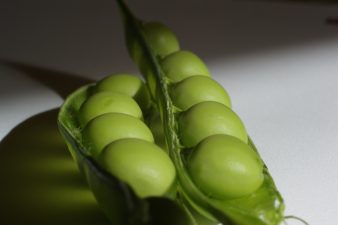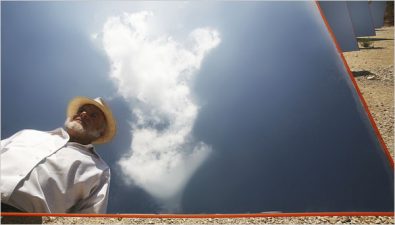 Plans to create a local cleantech industry drove part of Masdar’s ecotopian vision. That may be changing.
Plans to create a local cleantech industry drove part of Masdar’s ecotopian vision. That may be changing.
According to bidding documents obtained by Bloomberg News, the Abu Dhabi Future Energy Company (ADFEC) is about to decide on the awarding of Masdar’s second 100 MW solar project, for completion in 2013. ADFEC is a private joint stock company wholly-owned by the government of Abu Dhabi, and given a mandate to drive the Masdar project for a zero carbon city in the wealthy UAE.
Both projects would be part of meeting a goal to produce 7% of Abu Dhabi’s electricity from renewable energy by 2020 – together with the much smaller 2 MW solar PV plant shown being installed above.
Spain’s Abengoa Solar was awarded the construction of Masdar’s first 100 MW solar project: Shams 1, that began construction “on budget and on schedule” this year and is due to be completed in 2012. About 10 global and national banks and financial institutions have shown great interest in financing it. At $600 million, it is the largest concentrated solar power plant in the Middle East.
Potential solar developers bidding on Nour 1, the second 100 MW solar project, are to submit their qualifications by March 17th, and final decisions will be made at the end of 2011, according to Frank Wouters, director of Masdar Power.
Masdar Power expects that Nour 1 will cost less than Abengoa’s Shams 1 because of improving efficiency and “the normal learning curve for the industry,” Wouters said at a briefing in January.
Originally Masdar was going to manufacture its own solar panels from scratch right in Abu Dhabi but with panel prices dropping internationally, that no longer makes sense, other than from a PR point of view. Sensibly, it has been dropped. “You need scale and you need a regional market for that to make sense. The price of solar panels is dropping all over the world as the market becomes oversupplied,” noted Wouters.
This decision may be the reason for the secrecy. An important part of the UAE’s renewable energy plan was to build a domestic industrial base to assist in the spread of technology transfer and job creation.
But in 2009, Masdar invested in its own $160 million thinfilm manufacturing plant to get some hands-on solar manufacturing experience, and in Germany where workers’ skills and manufacturing conditions are already more conducive to high tech industries. Yet the most efficient cells it is able to produce there are 7.4%, somewhat less efficient than its competitors.
That experience itself may have led to the decision to seek alternative bids. An official in Masdar’s procurement office declined to speak about the tender for the second solar project evidenced by the 47-page bidding document.
The very visionary zero carbon Masdar City was originally something of an Ecotopian moon shot, and has come under criticism for not being perfectly realized right off the bat. But this realistic and sensible decision is a step in the right direction.
Even perfect zero carbon Ecotopias don’t have to entirely reinvent the wheel. Or the solar panel.
Photo credit: Jesse Fox
Previous stories on Masdar’s ecotopian efforts:
Masdar City: Small Hiccups, Or Total System Failure?
Re-Assessing Masdar City
Masdar Awards $600 Million Contract for ‘World’s Largest’ Thermal Solar Plant in UAE


